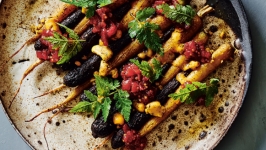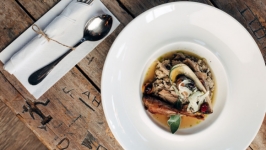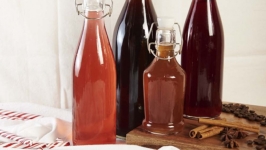A Decade of Change
It was a time when small plates were making their debut, natural wine was a near-alien concept, there were maybe two craft breweries in Ottawa and going to a fine dining restaurant meant taking some time to consider one’s outfit. The year was 2014, and edible Ottawa magazine launched that autumn with a mission to celebrate the local food culture in Ottawa, Gatineau, Eastern Ontario and Prince Edward County. The magazine had another ultimately unique goal: To cover those who grow, raise and produce the food we eat. In short, it brought farmers and producers to its elegant pages. Today, that continues to distinguish it.
To celebrate 10 years of telling stories, we take a look back at what was happening in Ottawa’s culinary scene in 2014 and how things have changed. The pandemic played a huge role, but we tried not to let it overshadow the progress.
What’s changed in 10 years?
So much has changed, says Adam Vettorel, chef and co-owner at North & Navy, which is now nine years old, and Gia Cantina, which opened in the Glebe in October 2020.
“The cost of everything has gone up,” Vettorel says. “I don’t think the average person realizes how much it affects small businesses. I think they think we benefit from purchasing power that doesn’t exist.”
Add to that the increased cost of services such as laundry for linens, garbage removal, water and electricity and it’s a daunting mix, he says. Given that rents have gone up, North & Navy has also had to increase salaries just to keep its staff.
“I never got paid anything near this,” Vettorel says. “10 years ago, $25 an hour would have been your highest paid person, now everyone needs to get paid that, otherwise, they can’t afford to live in the city.”
Coconut Lagoon owner and chef Joe Thottungal has seen plenty of change, including opening Thali, his second restaurant, this one in Centretown. Over the past decade, Thottungal has also seen increasingly diverse culinary options pop up in the city. He’s seen an emphasis on local and sustainable sourcing, technological integration, with online reservations, contactless payments and delivery apps as well as demand from younger diners for unique experiences, Instagram-worthy meals and ethical practices. Finally — and he’s a big player here — he’s seen more community engagement from restaurants, which are working with local charities and community partnerships to host events and foster customer loyalty.
Ottawa’s uniqueness
It was in 2010 when Washington Post writer Michael Kaminer praised Ottawa for its “unselfconscious cool” and wrote about how Ottawa’s kitchens might be some of the continent’s “bestkept secrets,” with their “locavore-fuelled creativity” that “arguably rivals that of San Francisco or Chicago, albeit with less ego, zero attitude and gentler prices.”
Four years later, says Jessie Duffy, an Ottawa hospitality veteran and current owner of Arlington Five, Ottawa was firmly coming into its own. Before chefs who studied here would leave the capital for larger metropolises, but by 2014, they were starting to want to stay.
At the same time, as restaurateur Stephen Beckta, owner of Beckta Dining & Wine, Play Food & Wine and gezellig, notes, casual fine dining was broadening its horizons beyond downtown, with quality neighbourhood restaurants opening in Hintonburg (Supply & Demand opened in 2013 and Stofa opened in 2017,) Westboro (Gezellig opened in 2012), the Glebe (The Rowan opened in 2015) and New Edinburgh (Fraser Café opened in 2008; Soca Kitchen opened in 2014 in Hintonburg and is now on Beechwood Avenue.) Meanwhile, Centretown has kept up, with new restaurants such as North & Navy (2015), Riviera (2016) and Aiana (2020).
Beckta says fine dining always existed, naming Café Henry Burger and Domus Café as two stalwarts of the late 1990s. When he moved back from New York and opened Beckta in 2003, he brought casual fine dining to town. And today, he says, it’s even more casual — a reflection of how society as a whole dresses.
“There is a casualness now that didn't exist before, where you can go and have a world-class meal in shorts and a T-shirt,” he says. “The pandemic certainly changed the game on that front.”
The wine world's changes
Beckta says natural wines started popping up in Ottawa in 2014, but then, they were a novelty and were embraced because they were different. “Over the past two or three years, we've seen a proliferation of well-made natural wines at reasonable prices that are not just weird, but also delicious and good value.”
Véronique Rivest, who owns Soif Bar à vin, says a lot of the trends she’s observed were already in motion and just continued to develop. Orange and natural wines were among them. And, in general, her wine program “has exploded,” having grown from 100 to 500 bottles on the list.
“Even though we have always championed wines with lower alcohol — we’re big fans of cool climate wines— it has become a bigger focus, as [has our] extensive non-alcoholic beverage program,” Rivest says. Breweries have also embraced the no- and low-alcohol trend with many local breweries making no-alcohol beer.
In terms of wine, Beckta says people’s sense of adventure has increased. “There's a greater appetite to try things that they are unfamiliar with, which is lovely to see,” he says.
When it comes to food, options for vegans, vegetarians and those with allergies has grown. Fully vegetarian restaurants such as Astoria and Pure Kitchen have also opened in the past decade and Kathā, which also offers gluten-free and dairy-free options, has a vegan blind tasting menu, as does Beckta.
“We made a very conscious decision,” says Teegavarap Sarath Mohan, Kathā’s chef and owner, and adds that they’ve accommodated many allergies. “At the end of the day, if our diners are happy, we are happy.”
When it comes to changes, Vettorel has seen an increase in vegetarianism and allergy requirements. “It’s not an exaggeration to say every third ticket has some kind of restriction,” he says. “And people are drinking less, so mocktails are on the rise.”
In the past 10 years, craft beer has come on strong in the city. Beau’s was the pioneer in 2006. Dominion City Brewing, which is also celebrating 10 years this year, launched in 2014, with many following, including Beyond the Pale, Tooth and Nail, Flora Hall Brewing and Spark, all more or less in the city centre.
“Back then, we were a team of friends and volunteers working off-hours to bootstrap an idea into reality,” says Dominion City co-founder Josh McJannett. “Today we're a team numbering almost 40, made up of some of the most talented brewers, hospitality staff, warehouse workers and delivery drivers anywhere in the city.”
Growers fuel the industry
McJannett says the Ottawa’s food and beverage scene owes a lot to the growth and strength of local farms and growers.
“They have fuelled the success of local producers like breweries, bakeries, restaurants, cideries and more,” McJannett says. “[I hope] we're just at the beginning, because what's happening today in the soil around Ottawa to grow quality, delicious, local food and ingredients is the beating heart of the city's food scene, and it's stronger now than it was a decade ago, notwithstanding [the] real challenges and setbacks we've seen through the pandemic and its aftermath.”
Roots and Shoots opened its doors in 2010 and Robin Turner and Jess Weatherhead remember it being a heady time for organic farmers. What’s changed? There are fewer students looking to work on farms to get the experience.
Those Turner sees applying now want to be in it for the long haul.
Customers’ expectations have also changed. CSAs used to be whatever was available and no one complained. Today, customers have demands — they want to put them on hold when they’re away, they want certain vegetables, not others. Today, Roots and Shoots has adapted. They can add things from the store, and pay by credit card instead of paying up front. “We’ve worked our asses off to make everything easy and customizable.” It’s been a business imperative, he says.
Co-operation not competition
Ottawa has long been known as a city where those in the hospitality industry help each other out.
“Daily, we recommend other restaurants to Soif clients, and we regularly have customers coming on the recommendation of another resto,” Rivest says. “[In addition], if one resto is short on an item, other restos will lend supplies. Or if someone’s fridge or freezer beaks, everyone else will lend space in theirs — [it’s] just normal community stuff.”
McJannett says Dominion City has long benefited from the kindness of its peers. “[A] number of times, we've borrowed a bag of grain or hops, or solved a problem with the help of a friendly brewery across town, [and that] has saved more than one brew day at Dominion City.”
Sara Pishva launched Top Shelf Preserves in 2013. She says the last two years have been tough because of dwindling margins and price sensitivity of consumers, but she remembers the kindness of chef Steve Mitton, then-owner of Murray Street Bistro. When she was between commercial kitchens in 2016, he allowed her to work from his restaurant before the evening service crew came in. “A real generous thing that he gave me keys and trusted me to use the space,” Pishva says.
Even culinary students are learning co-operation at a young age. Cory Haskins, a professor and academic chair at Algonquin’s School of Business and Hospitality, says several things have changed in his job, and giving even more back is one of them.
“We have increased our emphasis on giving back to the community,” Haskins says. “Today, we work with several local partners such as the Shepherds of Good Hope, Pinecrest Community Centre, and the Ottawa Food Bank through various initiatives.”









